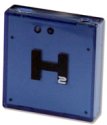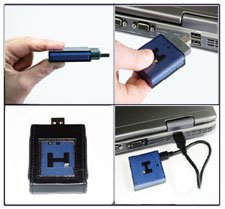Tiny USB hard drive dongle runs Linux
Nov 18, 2005 — by LinuxDevices Staff — from the LinuxDevices Archive — 2 views Tom's Hardware has reviewed a USB dongle based on a miniature 1-inch hard drive. The Zinside H2 is based on a Cornice 3GB “Storage Element” drive, and comes with a Ubuntu Linux installation CD that the publication used to install the older “Warty Warthog” release, creating a portable but slow Linux desktop.
Tom's Hardware has reviewed a USB dongle based on a miniature 1-inch hard drive. The Zinside H2 is based on a Cornice 3GB “Storage Element” drive, and comes with a Ubuntu Linux installation CD that the publication used to install the older “Warty Warthog” release, creating a portable but slow Linux desktop.
(Click for slightly larger view of tiny H2)
Cornice introduced its Storage Element miniature hard drive in January of 2004. The 4,400 RPM drive measures 0.17 x 1.69 x 1.43 inch device (4.7 x 42.8 x 36.4 mm), can operate during constant motion, and can survive 5-foot (1.5 meter) falls, the company claims. A 5mm thick version in a CompactFlash (CF) form factor is also available, as is a 4GB version.
Tom's measured throughputs for the 3GB Cornice drive between 3.5 and 7MB/sec, averaging just above the advertised 5MB/s. For the sake of comparison, SanDisk claims sustained write speeds just under 3MB/s for its “Ultra” CF cards, and just under 10MB/s for its “Ultra II” and “Extreme” products. CF cards have no seek time at all, however. Cornice appears not to publish seek times, and Tom's did not test for this.
The Zinside H2 is manufactured by Pertec, a French computer equipment OEM, and is also available (sans Ubuntu CD) under the Cosk-in brand.
The H2 measures 2 x 1.9 x 0.5 inches (51 x 48 x 12mm), weighs 1.2 ounces (35 gm), and comes with a USB cable and an adapter. Zinside sells its version with a leather case big enough to house both the H2 and its USB adapter.

Pertec's Cosk-in (top) and Zinside's H2-Ubuntu (shown in case in lower left)
Tom's reports that installing Ubuntu with the included Ubuntu CD takes only six minutes. However, the automatic installation offers little control for experienced users.
The installation creates a 2GB root partition, and 900MB “data” partition formated with a Microsoft filesystem. The distribution includes an “ehci” kernel for USB 2.0-capable hardware, as well as uhci (Intel USB 1.1) and ohci (normal USB 1.1) kernels.
Once installed, Ubuntu boots from the relatively slow Storage Element drive in four to five minutes, Tom's reports — about on par with booting a Knoppix-based distribution from a CF card. However, booting can take up to 13 minutes on systems that do not support USB 2.0.
On the upside, once the system finishes booting, the resulting environment is fairly complete, Tom's says, in terms of including a full range of application software, update utilities, and so on. Performance remains sluggish, however, due to the slow speed of the Storage Element.
The full Tom's Hardware review can be found here.
This article was originally published on LinuxDevices.com and has been donated to the open source community by QuinStreet Inc. Please visit LinuxToday.com for up-to-date news and articles about Linux and open source.
